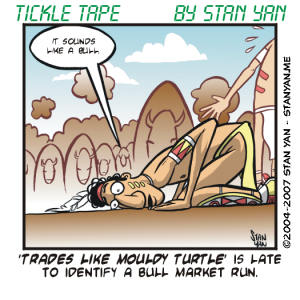There was no January Effect in 2005. No steady increase in prices on the last days of the year. Things looked a little gloomy at the end of the year. The last day of trading for 2005 seemed to be a downer, but the first day of trading for 2006 seemed full of optimism.
Retail sales weren’t so bad at the end of the year, and all indications suggest that the Fed will stop hiking interest rates. The economy seems to be growing. Good trading times may be just ahead. Are you ready? It’s times like these when the right mental edge can make all the difference. If you want to take advantage of trading opportunities for the New Year, it’s vital that you approach trading with the proper mindset. Be ready to work hard and do whatever it takes to come out a winner.
Unfortunately, many traders aren’t up to the challenge. They don’t have the proper mindset. They don’t have rock-solid confidence, and when they see a high probability setup, they flinch, make a trading error and end up with a losing trade. When market conditions are ideal, though, you must be ready to take advantage of them. Self-reproach is the biggest culprit. Many traders are ready to criticize their actions.
Some traders take setbacks in stride. Nothing seems to faze them. Why? They know how to put any setback into the proper perspective; they readily think, “It’s just business. It says nothing about me.” After years of experience, they’ve seen it all, lived through it all, and have learned that the markets are ultimately in control, and so there’s no reason to get unnecessarily upset about the uncertainty of it all.
Other traders, however, secretly fear that the markets will expose their inadequacies. Deep down, they believe they will eventually fail. A little voice in the back of their mind tells them so. This little voice isn’t correct, helpful, or accurate, but it has a subtle impact on the trader’s every move.
These thoughts usually happen just below our awareness. Dr. David Burns in his book, “Feeling Good,” calls these thinking patterns “automatic thoughts.” An event happens, such as the market goes against you, and you “automatically” think, “The truth is out; I can’t keep trading profitably.” The old saying, “I think, therefore I am,” is apt here. If you think you can’t keep up your trading performance, you won’t be able to. You’ll start believing the little voice that tells you that you can’t trade. And you will find that even a minor trading error will upset you.
How do you defeat the little voice? Dr Burns suggests writing down your automatic thoughts after they happen and analyzing them. Break them down, refute them, and convince yourself that they just aren’t true. For example, if you face a trading setback and think, “This setback shows that I’m not a natural-born trader; I might as well give up,” you will actually feel like giving up. This automatic thought is inaccurate, however. When you look at it more closely, you can see that it is not true.
First, setbacks happen to all traders. Setbacks should be expected. By thinking they are rare and significant, though, you are exaggerating their importance. You are “magnifying” the event into something bigger than it really is. A setback may reflect poor market conditions, and it may even reflect a lack of experience on your part to deal with a particular set of market conditions, but it is not so meaningful that it is a “sign” that you are not a “natural born trader.” Keep things in proper perspective. In addition, believing that there is such a thing as a “natural born trader” is another fallacy.
Maybe there is no such thing as a “natural born” anything. The philosopher John Locke argued that the mind is a blank slate. You can learn how to do anything if you set your mind to it. Granted, you may not ever be Paul Tudor Jones, but you don’t need to be a “Market Wizard” to make profits in the markets. Believing that only a top-notch trader can make money in the markets and that you will never be one of them, just sets you up to feel bad about yourself. Forget about whether there are or are not “natural born traders.” Work under the assumption that you can go far if you work at your own pace to master the markets and work as hard as you possibly can.
No one really knows what the future will hold, but the start of the New Year looks promising. Don’t sabotage your efforts through self-doubt and unreasonable self-criticism. You can trade profitably if you put in the time and effort. Think optimistically, work hard, and take home the profits.


